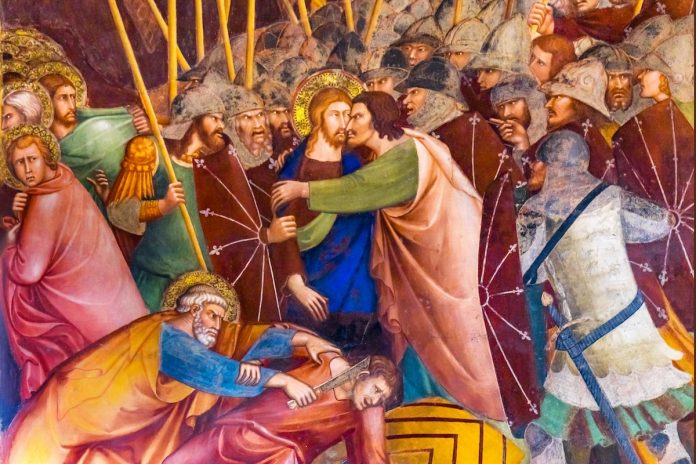In the Holy Week liturgy, today we encounter the person of Judas. It is only in the Gospel of John that Judas is described as a thief.
Indeed, we can notice in the development of the Gospel tradition that there is an increasing demonization of Judas. In Mark’s Gospel, it is written that he betrayed Jesus, and money was promised to him (Mk. 14:10).
Nowhere is it written in Mark that he betrayed Jesus for the money. Later, in Matthew’s Gospel, it is written that he asked the chief priests, “What will you give me if I deliver him to you?” (Mt. 26:14).
In Luke’s Gospel, the betrayal of Jesus is part of a cosmic battle since it is written that “Satan entered into Judas,” (Lk. 22:3). (Of course, it can be argued that he was not fully responsible for what he did because of the influence of Satan).
That Satan entered Judas is also in John’s Gospel (tomorrow’s Gospel reading) but today, Judas is already described as a thief even before he betrayed Jesus.
Moreover, in the Gospel of Mark, the ones who vehemently complained of unnecessary expense to the detriment of the poor were “some” (Mk. 14:5) people, whereas in the Gospel of Matthew, it is the disciples, (Mt. 26:8).
In the Gospel of John, which is today’s Gospel reading, it is Judas alone who protested against what Mary (also unnamed in the gospel parallels) did.
We cannot know what actually led Judas to betray Jesus. But basing our reflections on the Gospel reading, there is a contrast between the sincerity of Mary, the brother of Lazarus on the one hand, and the complaining remark of Judas.
In appreciation of what Jesus did to her brother, Mary anointed Jesus’ feet and wiped them with her hair (a conflation of two rituals: the first is the washing of the feet which is done to travelers traversing through dusty roads and the second is the anointing of the head).
In contrast, Judas saw the woman’s action as an unnecessary expense that could have been given to the poor.
What did Jesus mean when he said, “The poor you will always have with you, but me you will not always have”?
Every person must be truly concerned with the poor. In fact, concern for the poor marked Jesus’ ministry and message.
I can grant that Judas’ concern for the poor was authentic. But in that specific situation, Jesus was also in need of some show of support and concern.
To illustrate this point, I may give something expensive to someone diagnosed to be living on borrowed time. Then there would be comments that what I gave was unnecessary since the person is going to die in a few days.
But at that point in time, the gift lifted the spirit of the person. That is what Mary did to Jesus.
Fr. Ramon D. Echica is the Dean of Studies of the San Carlos Major Seminary. He obtained his doctorate in Sacred Theology from the Catholic University of Leuven (Katholieke Universiteit Leuven) in 1998.









